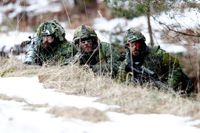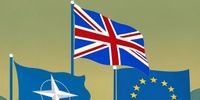In a time of shifting geopolitical dynamics, the security relationships among the United States, Canada, and European nations are under increasing scrutiny. As Donald Trump returns to the White House, the implications for defense collaborations and international trust are more pressing than ever.
A recent letter to the editor referenced Paul Schratz's column on February 10, 2025, which argues that Canada's long-standing image of being a close ally of the US may no longer hold true. The letter pointed out that left-leaning political factions in Canada have perpetuated an anti-American narrative for decades, a sentiment underscored by Canada's UN vote supporting Hamas and its sluggish response to NATO commitments.
In light of these developments, the relationship dynamics have led some to question Canada's commitment to the Five Eyes intelligence-sharing framework and its historical military collaboration with the US. Concerns over Canada's defense posture have prompted Prime Minister Mark Carney to initiate a review of the planned purchase of F-35 fighters from the US. A notable matter also raised was the potential for the US to expel Canada from critical intelligence arrangements under Trump's administration.
This notion appears compounded by Trump's perceived disregard for traditional alliances, as suggested by a Canadian military expert. Analysts argue that the US's detached approach may require Canada to redefine its strategic independence in defense spending, acknowledging the necessity to meet NATO's target of 2% of GDP.
Meanwhile, the evolving scenario in Europe reflects a similar urgency. Following Trump's electoral success, European leaders recognize a need to protect their security interests in light of fluctuating American commitment. Britain's historic role in European defense is being re-evaluated, with experts advocating for increased military contributions alongside bolstered alliances.
According to a contributor at the Council on Geostrategy, the UK should revisit its grand strategy implemented before the First World War, leveraging its naval power and financial resources. This strategy encourages Britain to become a more capable and independent participant in European defense while fostering collaborations with countries like Poland and the Baltic states.
Further emphasizing the UK's strategic necessity, a commentary from central figures in European defense highlighted Britain's significant role in military assistance to Ukraine. With a pledge of £7.8 billion for military aid, the UK is showcasing its commitment as a transatlantic ally, aiming to fortify NATO’s credibility as concerns mount about US military reliability.
The consensus amongst European analysts is clear: as American support dims, Britain must enhance its military presence and technological capabilities. The widespread call for a European deterrent mechanism could coincide with Britain's need to strengthen ties not only in traditional partnerships but also with broader European allies.
In addition, with reports of potential British troop deployments to Ukraine arising, questions emerge about the sustainability of Britain's current military capabilities, with concern that reduced defense spending might hinder its operational readiness.
Just as the UK grapples with these challenges, Canada is expected to undergo its own critical transformation. A Canadian military professor emphasized that Canada must pivot from viewing the US as a central military partner, suggesting a long-term goal to cultivate an independent defense strategy. This shift is necessitated by the recognition that Canada’s existing defense collaborations may inadvertently entrench dependence on American military infrastructure.
Strategic autonomy is now marked by a proactive approach, which includes fostering military relationships with European and Asian nations. This new strategy seeks to diversify Canadian defense partnerships, minimizing overreliance on US capabilities to prioritize domestic industry development and multilateral exercises with other allies.
Historically shaped by decades of military cooperation, the Canadian Armed Forces realized their integration with American forces as non-negotiable. However, recent sentiments shift as experts propose that Canada's future defense framework must rely less on American infrastructure and more on building exclusive capabilities that reflect its national interests.
Canada's recent procurement of American-made aircraft exemplifies this dilemma, with experts urging a reconsideration of national priorities to sustain its military resilience amidst an unpredictable global landscape. As the geopolitical situation develops, embracing European partnerships and joint initiatives could illuminate a path forward for Canada.
While transformations loom for both nations, the pressing demand for global security adaptation peaks amid volatility in US foreign policy. Unforeseen realities beckon practical introspection as both Canada and the UK navigate their defense strategies in an era marked by American unpredictability.
To conclude, the need for independent strategic capabilities looms large for both Canada and its allies in Europe as they face an uncertain security environment under a potentially isolationist US administration. The decade ahead promises a redefinition of relationships, reshaping how these nations approach their collective defense amidst possible threats and geopolitical reconfigurations.




